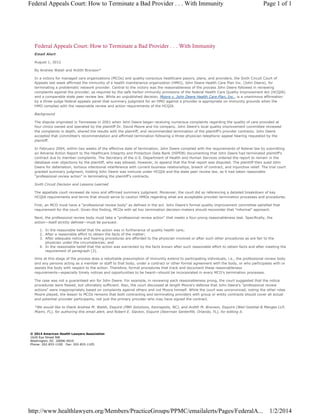More Related Content
Similar to WalshA AHLA article re terminating bad providers with immunity (20)
WalshA AHLA article re terminating bad providers with immunity
- 1. Federal Appeals Court: How to Terminate a Bad Provider . . . With Immunity
Email Alert
August 1, 2012
By Andrew Walsh and Ardith Bronson*
In a victory for managed care organizations (MCOs) and quality-conscious healthcare payors, plans, and providers, the Sixth Circuit Court of
Appeals last week affirmed the immunity of a health maintenance organization (HMO), John Deere Health Care Plan Inc. (John Deere), for
terminating a problematic network provider. Central to the victory was the reasonableness of the process John Deere followed in reviewing
complaints against the provider, as required by the safe harbor immunity provisions of the federal Health Care Quality Improvement Act (HCQIA)
and a comparable state peer review law. While an unpublished decision, Moore v. John Deere Health Care Plan, Inc., is a unanimous affirmation
by a three-judge federal appeals panel that summary judgment for an HMO against a provider is appropriate on immunity grounds when the
HMO complies with the reasonable review and action requirements of the HCQIA.
Background
The dispute originated in Tennessee in 2001 when John Deere began receiving numerous complaints regarding the quality of care provided at
four clinics owned and operated by the plaintiff Dr. David Moore and his company. John Deere's local quality improvement committee reviewed
the complaints in depth, shared the results with the plaintiff, and recommended termination of the plaintiff's provider contracts. John Deere
accepted that committee's recommendation and affirmed termination following a three-physician telephonic appeal hearing requested by the
plaintiff.
In February 2004, within two weeks of the effective date of termination, John Deere complied with the requirements of federal law by submitting
an Adverse Action Report to the Healthcare Integrity and Protection Data Bank (HIPDB) documenting that John Deere had terminated plaintiff's
contract due to member complaints. The Secretary of the U.S. Department of Health and Human Services ordered the report to remain in the
database over objections by the plaintiff, who was allowed, however, to append that the final report was disputed. The plaintiff then sued John
Deere for defamation, tortious intentional interference with current business relationships, breach of contract, and injunctive relief. The trial court
granted summary judgment, holding John Deere was immune under HCQIA and the state peer review law, as it had taken reasonable
"professional review action" in terminating the plaintiff's contracts.
Sixth Circuit Decision and Lessons Learned
The appellate court reviewed de novo and affirmed summary judgment. Moreover, the court did so referencing a detailed breakdown of key
HCQIA requirements and terms that should serve to caution HMOs regarding what are acceptable provider termination processes and procedures.
First, an MCO must have a "professional review body" as defined in the act. John Deere's formal quality improvement committee satisfied that
requirement for the court. Given this finding, MCOs with ad hoc termination decision-makers should reconsider that "informal" approach.
Next, the professional review body must take a "professional review action" that meets a four-prong reasonableness test. Specifically, the
action—itself strictly defined—must be pursued:
1. In the reasonable belief that the action was in furtherance of quality health care;
2. After a reasonable effort to obtain the facts of the matter;
3. After adequate notice and hearing procedures are afforded to the physician involved or after such other procedures as are fair to the
physician under the circumstances; and
4. In the reasonable belief that the action was warranted by the facts known after such reasonable effort to obtain facts and after meeting the
requirement of paragraph (3).
Only at this stage of the process does a rebuttable presumption of immunity extend to participating individuals, i.e., the professional review body
and any persons acting as a member or staff to that body, under a contract or other formal agreement with the body, or who participates with or
assists the body with respect to the action. Therefore, formal procedures that track and document these reasonableness
requirements—especially timely notices and opportunities to be heard—should be incorporated in every MCO's termination processes.
The case was not a guaranteed win for John Deere. For example, in reviewing each reasonableness prong, the court suggested that the notice
procedures were flawed, but ultimately sufficient. Also, the court discussed at length Moore's defense that John Deere's "professional review
actions" were inappropriately based on complaints against others and not Moore himself. While the court was unconvinced, noting the other roles
Moore played, the lesson to MCOs remains that both contracting and terminating providers with group or entity contracts should cover all actual
and potential provider participants, not just the primary provider who may have signed the contract.
*We would like to thank Andrew M. Walsh, Esquire (PBH Solutions, Kannapolis, NC), and Ardith M. Bronson, Esquire (Weil Gotshal & Manges LLP,
Miami, FL), for authoring this email alert, and Robert E. Slavkin, Esquire (Akerman Senterfitt, Orlando, FL), for editing it.
© 2014 American Health Lawyers Association
1620 Eye Street NW
Washington, DC 20006-4010
Phone: 202-833-1100 Fax: 202-833-1105
Page 1 of 1Federal Appeals Court: How to Terminate a Bad Provider . . . With Immunity
1/2/2014http://www.healthlawyers.org/Members/PracticeGroups/PPMC/emailalerts/Pages/FederalA...
